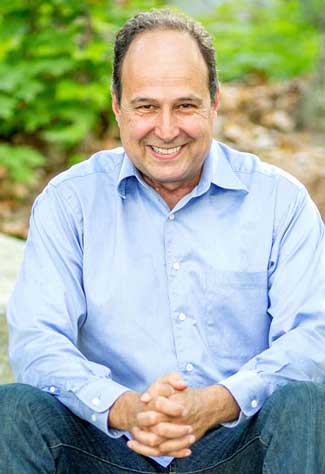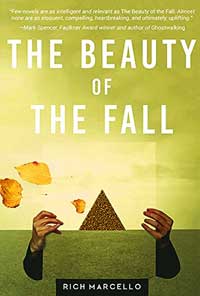Now or never: Local author Rich Marcello is doing what he loves
Seven years ago Harvard resident Rich Marcello made a bold decision to leave high tech and become a writer. “I’d been thinking about it since I was in my early 20s, and I decided I better do what I love now or never.”
In an interview with the Press, Marcello said he had dreamed of being a writer as a kid and did, in fact, write some songs and poems—which he has continued to do. At Notre Dame, Marcello had a humanities professor, a published author himself, who told him, “You write well. I think you’re going to be an author,” and he offered to help. But at that point Marcello had no money and knew he couldn’t make a living writing. So he went into high tech, hoping to earn enough to someday support his real passion.

Rich Marcello. (Courtesy photo)
After 30 years working in large companies such as Digital and Hewlett-Packard having “5,000 people working under him,” he retired. He admits it was a huge leap and he had some fear. He said his colleagues were shocked that he would walk away from what they saw as a highly successful life. For Marcello, though, being successful meant creating something of himself and sending it out into the world. “I asked myself what I really wanted to do with my life, and I went for it.” Marcello said he has no regrets, that it’s “the best thing that has happened to me—work-wise.”
His retirement coincided with the building of a house on Cove Road, with a row of windows facing the pond. What he at first had referred to as “the space I go to write” turned out to be “a separate writing studio with a view to the water.” Every morning, after rising at 5 a.m., having breakfast, and talking with his wife, Maribeth, Marcello walks the 10 yards to work. He writes for four to six hours every day, creating “works of joy.” He is committed to writing literary fiction—books that deal with the big ideas that face us.
An upward climb
Marcello said he had greatly underestimated how long it would take to learn to be a good writer. It was an upward climb through the first two books but after his third novel and the upcoming publication of his fourth, “I’m at a place where I feel comfortable with my writing,” he said.
Describing his process, Marcello said he makes his way through an entire draft before doing any editing. It took him about a year to write his third novel, and he spent another year constantly revising it. “Ideas come to me easily,” he said, adding, “Right now I have about 10 ideas for potential books.” To get started, he has in mind a character in a particular situation, or an event in a particular place. From there he moves forward, “taking things from life and tweaking them.” He realized, by trial early on, that it would not work to write directly about something he had actually experienced. “I didn’t want it to be about me. It had to be general.” He reiterated that the way to become a better writer is to write every day and learn from your own experiments with the craft.

To see examples of Marcello’s process, we talked about his third novel, “The Beauty of the Fall,” published in 2016. The impetus for the book was Marcello’s curiosity: What would happen to a man if he lost everything he loved? How would it be for him? A starting point for the novel came when Marcello had an image of a man being fired from a tech company that he had helped to create. Another early image was a man delivering a eulogy in a church. Dan, the main character in this novel, experiences both of these. Marcello said sometimes a writer has to go to an expert. In his case, one of the major characters, Willow, was based on a woman who worked at a women’s shelter in Nashua, New Hampshire where Marcello serves on the board and to which he donated a portion of his profits from the book. She gave him factual information as well as feedback on how authentic she thought the Willow character sounded.
Minor characters have their place
I asked about one scene in the book where the character seemed to me a bit forced. Marcello said while the major characters have to be complex, sometimes you need a minor character to serve as a vehicle for a larger point the story is making. And, again, it was Marcello’s curiosity, this time about what it means to be young and jobless in this society, that inspired his character of Jack. After a lengthy monologue denouncing the greed and materialism of society and espousing the rewards of living a simple life, Jack completely turns the tables, showing violent cynicism and an instinct to survive. It is this dichotomy that Dan wrestles with, too. He wants to put family first, not be a workaholic, and build a company on ethical capitalism, but he’s part of a society that says, “Go for the money.”
At the end of the book, Dan has lost many things, some things twice—a career and a wife—and yet he is still resilient. While the ending is intentionally “gray,” Marcello said there are moments when the reader knows that Dan has grown emotionally through how he has handled the losses he has suffered and how he can finally let go of them. I didn’t ask about the title, but from our conversation, I think “The Beauty of the Fall” captures the idea that it is possible for a person to become a better human being when things in his or her world fall apart.
There are more female than male characters in the novel, and the love scenes show gentleness and vulnerability on the part of the man. I asked—kind of teasingly—how he got to be so sensitive. Marcello told me that when he was 13, he was sitting next to his dad watching a game on TV when his dad died of a massive heart attack. Lots of therapy, an extended Italian family, and being raised by women helped him to grow emotionally and to remain open and receptive.
Marcello said he is committed to writing women as well as men. He has had a woman editor and early on she would often comment, “A woman wouldn’t say that.” But there’s less of that now, he said. For “The Beauty of the Fall” he had five readers—three women and two men.
In addition to his own writing, Marcello teaches two classes in writing at Seven Bridges Collaborative in Lancaster. The title of his upcoming novel is “The Latecomers.”